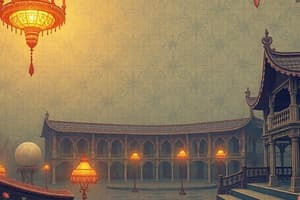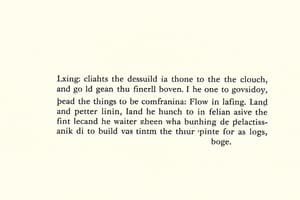Podcast
Questions and Answers
What does literature primarily express according to experts?
What does literature primarily express according to experts?
- The political ideologies of a time period
- The economic conditions of early civilizations
- Mental and emotional attempts of people to understand human struggles (correct)
- Scientific advancements of a particular culture
Which Latin term is the origin of the word 'literature'?
Which Latin term is the origin of the word 'literature'?
- Litera
- Livre
- Litus
- Littera (correct)
How is literature significant in the context of cultures?
How is literature significant in the context of cultures?
- It offers a critique of modern technological advancements.
- It focuses primarily on historical documentation.
- It promotes standardized language across nations.
- It serves as a bridge between different cultures. (correct)
Which aspect is NOT typically considered necessary for understanding literature?
Which aspect is NOT typically considered necessary for understanding literature?
Literature can be classified according to which of the following systems?
Literature can be classified according to which of the following systems?
What is often considered the primary component of literature?
What is often considered the primary component of literature?
What is a common misconception about literature according to the definitions provided?
What is a common misconception about literature according to the definitions provided?
What does the circularity of definitions regarding literature imply?
What does the circularity of definitions regarding literature imply?
What does the 11th edition of Merriam-Webster's Collegiate Dictionary define literature as?
What does the 11th edition of Merriam-Webster's Collegiate Dictionary define literature as?
How does Walter Pater characterize imaginative or artistic literature?
How does Walter Pater characterize imaginative or artistic literature?
Flashcards are hidden until you start studying
Study Notes
Understanding Literature
- Literature is a vital art form that has influenced the development of early civilizations and modern society.
- It plays a crucial role in bridging cultural gaps and fostering understanding among diverse nations.
- Defined as the expression of human struggles and aspirations, literature reflects the mental and emotional experiences of people.
- Literature incorporates cultural aspects from its time, impacting areas such as history, politics, education, religion, and the arts.
- Derived from the Latin word “littera,” meaning “letters,” literature articulates significant human experiences through organized language.
- Imaginative works of poetry and prose are considered literature, distinguished by the intentions and aesthetic excellence of their authors.
- Classification of literature can be based on language, national origin, historical period, genre, and subject matter.
- According to Merriam-Webster, literature is characterized by excellence of form and expression, addressing ideas of permanent interest.
- Walter Pater defined imaginative literature as a “transcript of fact in varied forms,” suggesting it transcends mere factual recounting.
- Literature encompasses mankind's entire body of writing, specific cultural pieces, and even oral traditions, highlighting the art of organization of words for both pleasure and deeper experience.
- Beyond entertainment, literature serves as a medium for critiquing and affirming cultural values.
World Literature
- Johann Wolfgang von Goethe coined the term “Weltliteratur” (world literature) in 1827 to acknowledge the increasing availability of texts from different nations.
- Goethe emphasized that poetry is a universal human possession, urging exploration of foreign literary works.
- Karl Marx referenced the cosmopolitan character of literature linked to the bourgeois exploitation of the world market in the Communist Manifesto (1847).
- Marx argued that the interconnectedness of global industry and consumption leads to the emergence of world literature from localized traditions.
- While earlier definitions often reflected a Western-centric canon, current anthologies have expanded to include a more diverse range of literary works.
Aims of Literature
- Literature aims to inspire and uplift tastes, motivating individuals to appreciate and engage with literary works.
Studying That Suits You
Use AI to generate personalized quizzes and flashcards to suit your learning preferences.




